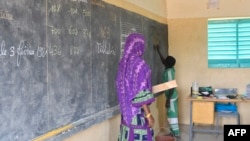Africa is facing a shortage of teachers in many schools due to an increase in the number of students seeking education and a lack of resources in the education sector, according to UNESCO.
The United Nations Educational, Scientific and Cultural Organization (UNESCO) says despite some gains in the past five years in teacher recruitment, progress has been slow, and many countries need to increase the number of teachers they recruit yearly.
Patrick Nkengne, a senior education analyst at UNESCO, says a small number of teachers are attending to millions of students in Africa.
"When a classroom welcomes more than 100 students instead of the about 50 students it was built for, or as opposed to a ratio of 40 to 50 students per teacher recommended by the norms and standards, it clearly shows a shortage. As the number of classes in this condition increases, the issue of shortage becomes acute," Nkengne said.
For Africa to reach its education goals, UNESCO says the continent has to recruit at least 15 million teachers by 2030, both in primary and secondary schools.
The agency said the Central African Republic, Chad, Mali and Niger would need the highest number of primary teachers, with 6 percent or more growth annually.
In secondary education, higher annual growth in teacher numbers is needed in many African countries.
Emmanuel Manyasa, an education expert based in Kenya, says many schools are producing uneducated children due to the lack of teachers.
"So, you have both dissatisfied teachers and dissatisfied learners. The learners aren't getting the attention and the support they need. The teachers are overwhelmed by the big numbers and the long hours of teaching, which don't even give them time to prepare for lessons," he said. "So, they come to class unprepared, disenfranchising learners even more. And eventually, our schools just become growth centers, where children go to grow with very little learning happening there."
Some experts blame financial constraints, with the few resources available not being utilized, leading to a waste of those resources.
In countries with enough teachers, Nkengne says, schools struggle to provide quality education to the learners due to poor teacher qualifications.
"In a normal situation, a teacher must be adequately equipped to care for the students so that they can effectively acquire knowledge at school. Unfortunately, it was demonstrated that in many cases, a considerable number of those who are supposed to play the role of teachers do not even have the mastery of the subjects they are supposed to teach," he said. "In those cases, students cannot learn because basically, they don't have a teacher in front of them. Those cases are not easy to identify. To do so, the system needs to make teachers pass a test."
Experts say there are not enough resources to conduct tests to check the educational knowledge of teachers.
Manyasa says teachers need to be encouraged to bridge the gap for those not getting an education.
"We need to be able to make sure there is a fair distribution of the teachers across the country. And with that goes the issue of, how do we incentivize teachers to work in areas that are generally not preferred?" he said. "Mostly, they are not preferred because of harsh climatic conditions. Sometimes because of perennial insecurity problems. Sometimes because of the fact that they are rural. So, how do we incentivize teachers to work in those areas so that we can improve the distribution of the teachers across the country? I think that that is critical."
UNESCO is urging African governments to assess the anticipated teacher requirements for the next three to 10 years, reflect on an initial training approach that can produce the necessary number of teachers, and ensure adequate resources for the recruitment and training of additional educators.




